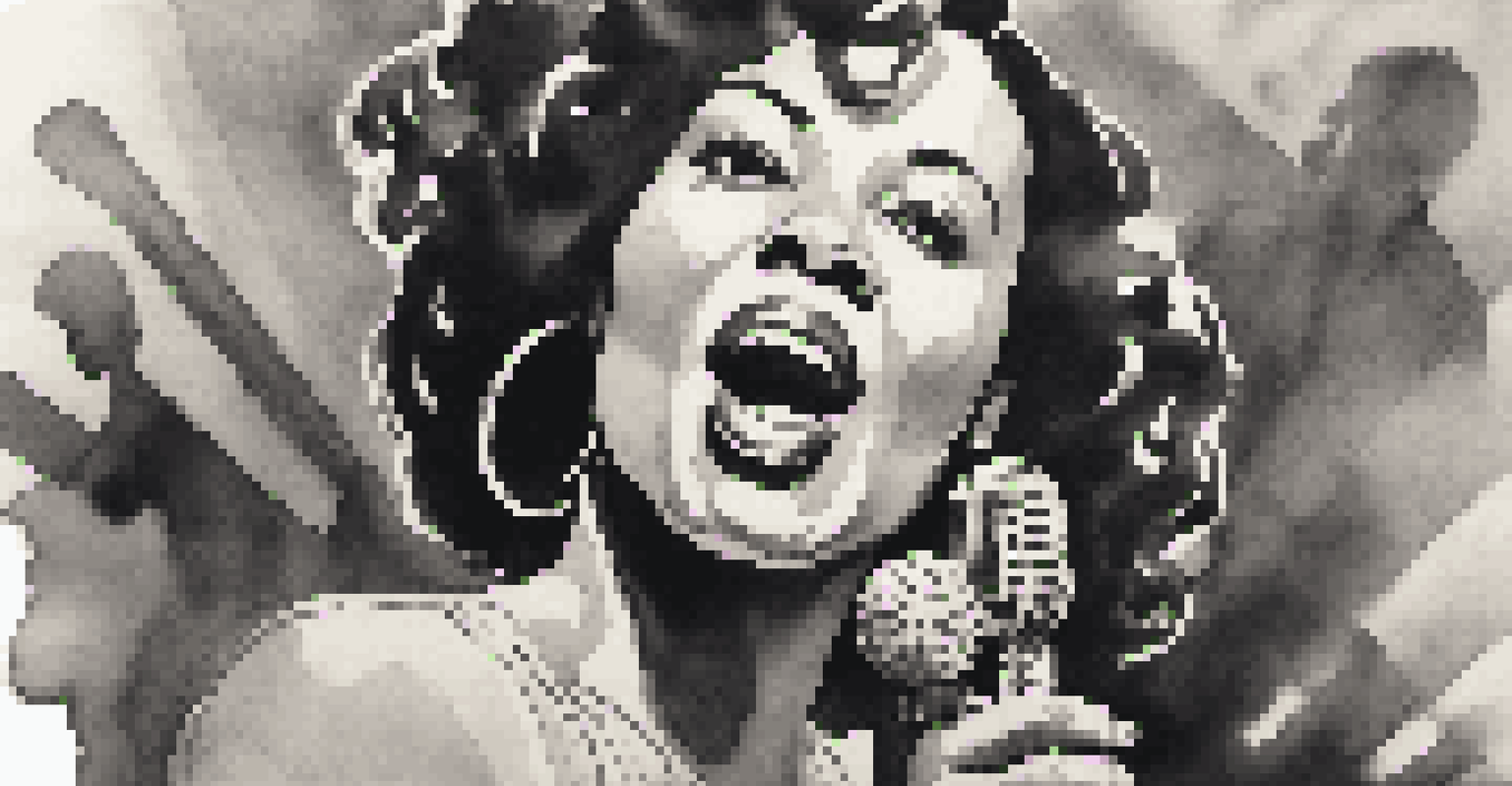The Role of Music in Shaping Feminist Identity and Activism

Music as a Tool for Feminist Expression and Identity
Music has long served as a powerful medium for self-expression, especially for women. Through lyrics, melodies, and rhythms, artists convey their personal experiences and societal challenges, shaping their identities. For many, songs become anthems of empowerment, allowing individuals to resonate with shared struggles and triumphs.
Music can change the world because it can change people.
For example, artists like Billie Holiday and Joan Baez used their music to address social injustices and gender inequalities, creating a sense of community among listeners. Their work not only reflected their own journeys but also inspired others to embrace their identities boldly. This collective experience through music fosters a strong sense of belonging and solidarity.
Moreover, music allows for the exploration of intersectionality within feminism, giving voice to diverse experiences. This inclusivity enriches the feminist movement, encouraging dialogue about race, sexual orientation, and class. In this way, music becomes not just a form of entertainment but a vital tool for shaping feminist identities.
Historical Context: Music and Women's Movements
Throughout history, music has played a crucial role in various women's movements. From the suffragette songs of the early 20th century to the protest ballads of the 1960s, music has united activists around common goals. These songs often served as rallying cries, boosting morale and reinforcing the determination to fight for women's rights.

For instance, the song 'Sister Suffragette' from the movie Mary Poppins became a lively anthem for the women's suffrage movement, illustrating the power of music to inspire change. This historical context shows that music has not only reflected societal sentiments but actively shaped them, mobilizing individuals toward collective action.
Music Empowers Feminist Expression
Artists use music to share personal experiences and societal challenges, creating anthems of empowerment and fostering community.
Today, the legacy of these musical movements continues to influence modern activism. Songs that highlight issues such as reproductive rights and gender equality echo the sentiments of earlier struggles, reminding new generations of the ongoing fight for women's rights. This continuity underscores music's enduring role in feminist activism.
The Role of Feminist Music Genres
Certain music genres have become synonymous with feminist movements, creating spaces for women to express their realities. Genres like punk, folk, and hip-hop showcase a rich tapestry of feminist voices, each bringing unique perspectives and styles. For example, punk music has often championed rebellion against patriarchal norms, empowering women to challenge societal expectations.
I think music is a powerful tool for change, and it can be a catalyst for social movements.
Similarly, folk music's storytelling tradition allows artists to share personal narratives that resonate with broader feminist themes. Artists like Ani DiFranco have carved out a niche by blending personal experience with social commentary, creating songs that encourage self-reflection and activism. In hip-hop, female artists like Nicki Minaj and Cardi B challenge stereotypes, redefining what it means to be a woman in a male-dominated industry.
These genres not only give women a platform but also help listeners connect with feminist ideals in a relatable way. By integrating personal stories with social issues, these artists foster a sense of community, inviting others to join the conversation and the movement. This highlights how music can serve as a catalyst for change.
Music Festivals as Platforms for Feminist Activism
Music festivals have increasingly become venues for promoting feminist causes and activism. Events like the Lilith Fair and the Women's March concert series highlight female artists and offer platforms for discussions on gender equality. These festivals create a vibrant atmosphere where music and activism intersect, drawing attention to important issues.
Moreover, festivals often feature workshops and panels alongside performances, encouraging attendees to engage with feminist topics actively. This combination of entertainment and education empowers participants to take action in their communities. For example, the 'Feminist Festival' not only showcases female musicians but also provides resources for advocacy and activism.
Historical Role of Music in Activism
Throughout history, music has united activists and served as a rallying cry for women's rights movements, illustrating its power to inspire change.
As attendees immerse themselves in the music, they're also prompted to reflect on their values and beliefs. This dual experience fosters a strong sense of community among like-minded individuals, amplifying the impact of feminist activism. Ultimately, music festivals serve as a microcosm of the broader feminist movement, illustrating the synergy between art and activism.
The Impact of Social Media on Music and Feminism
In today’s digital age, social media has transformed how music influences feminist identity and activism. Platforms like Instagram, TikTok, and Twitter allow artists to share their messages quickly and widely, reaching diverse audiences. This accessibility gives rise to new voices and perspectives, enriching the feminist dialogue.
For instance, viral songs like 'WAP' by Cardi B and Megan Thee Stallion have sparked conversations about female empowerment and sexuality. These discussions often extend beyond music, prompting debates about societal norms and expectations. Social media enables fans to engage with these topics, creating a sense of community and shared purpose.
Furthermore, social media serves as a powerful tool for mobilizing activism. Hashtags like #MeToo and #TimesUp have not only amplified the voices of survivors but have also led to real-world actions and changes. This illustrates how music and social media intertwine, fostering a dynamic environment for feminist activism that resonates on a global scale.
Global Perspectives: Music and Feminist Movements Worldwide
Feminist movements around the world have harnessed the power of music to address local issues and inspire change. In many cultures, songs serve as a means of protest against gender-based violence, discrimination, and inequality. For instance, the 'Ni Una Menos' movement in Latin America uses music to unite voices against femicide and violence, showcasing the global impact of music in activism.
Artists like Angelique Kidjo and Shakira have utilized their platforms to raise awareness about women's rights in their respective regions. By blending traditional sounds with contemporary messages, they create a unique space for dialogue and change. This cross-cultural exchange enriches the global feminist movement, illustrating that music can transcend borders.
Social Media Amplifies Feminist Voices
Platforms like Instagram and TikTok allow musicians to rapidly share messages and mobilize activism, enhancing the feminist dialogue globally.
Moreover, these global perspectives highlight the diverse challenges women face, reminding us that feminism is not a one-size-fits-all movement. By appreciating the role of music in different contexts, we can cultivate a more inclusive understanding of feminism. This international solidarity strengthens the overall movement, emphasizing the importance of unity in the fight for women's rights.
Future Directions: Music, Feminism, and Activism
As we look to the future, the relationship between music and feminism continues to evolve. Emerging artists and genres are pushing boundaries, using innovative sounds and messages to address contemporary issues. This evolution ensures that the feminist movement remains relevant and responsive to the changing cultural landscape.
Additionally, collaborations between artists from different backgrounds can amplify feminist messages and create more inclusive spaces. By working together, musicians can share diverse experiences and perspectives, enriching the feminist narrative. This collaboration fosters a sense of unity within the movement, encouraging collective action.

Ultimately, the role of music in shaping feminist identity and activism is far from static. As societal issues arise and change, music will undoubtedly adapt, serving as both a reflection of and a catalyst for progress. This dynamic relationship underscores the enduring power of music as a tool for empowerment and social change.